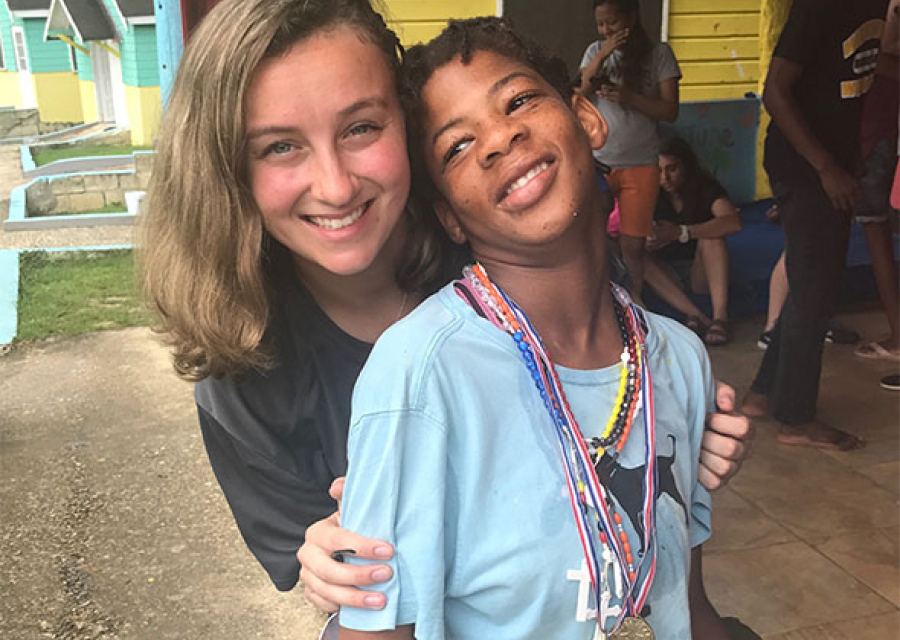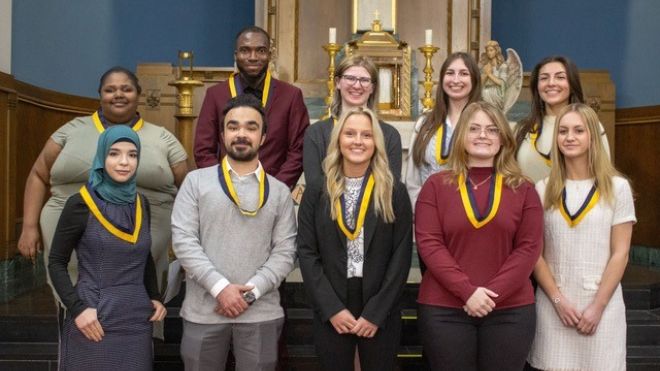
A member of the first All-College Honors class, William Schoenl ̉63, PhD, remembers his professors as if he had seen them yesterday.
“I had Drs. George Lavere (philosophy) and Leslie Warren (English) as teachers,” he recalls. “George Lavere ambled down the corridor as if he were on a pleasant walk, while Leslie Warren sprang into the classroom! Both were excellent teachers and illustrated the theory of “being yourself and using your own style in teaching.”
Schoenl took those words to heart. He forged his own path as a professor of history for 45 years at Michigan State University.
“The skills that I learned in the program have been helpful in my life and career,” he says.
“From the time of its inception, the Canisius All-College Honors Program developed the whole person, through an academically rigorous curriculum that emphasized seminar-style instruction, and is supplemented by invaluable co-curricular and extra-curricular experiences,” says Bruce J. Dierenfield, PhD, program director and professor of history.
Long regarded as the "academic crown jewel" of Canisius, the All-College Honors program hits a major milestone when it celebrates its 60th anniversary in 2020.
According to Dierenfield, the initial idea for the program came from the late dean of faculty Rev. William Scott SJ, who suggested Canisius consider an academic seminar to bring out the best and brightest students. Two years later, he introduced the first interdisciplinary sophomore honors seminar. Students who successfully completed the seminar could take advantage of such privileges as exemptions from certain final exams. Rev. Vincent Blehl, SJ, of the English Department and Levere served as the first co-chairs.
The first honors class was held in 1960 and consisted of 19 students who had to meet the minimum requirements of a 3.0 GPA and have a healthy appetite for “a strenuous program of collateral reading and independent thinking."
Throughout the years, the director role changed hands several times.
But it was Robert J. Butler, PhD, professor emeritus of English who served as the first full-time director for 21 years (1985 – 2006) and brought the program back from near extinction. He adjusted the curriculum so students of a broader range of majors could enroll and added enrichment programs to encourage deeper thought.
“Honors-related activities, such as guest speakers or trips, directly connect to the curriculum but also bring students and faculty together as a learning community,” says Butler. “The Jesuit ideals of cura personalis or ‘care for the individual,’ and Magis or ‘more,’ are clearly exemplified in the All-College Honors Program.”
(L-R): Lauryn Saldana ᾽20, Sal Zarrella ᾽20, Claire Rosenecker ᾽21 and Robert Butler, PhD, professor emeritus of English, volunteered at St. Luke’s Mission of Mercy last winter.
Since Butler’s remarkable tenure, the program has reached new levels of excellence under Dierenfield’s leadership (2006-present). Among other things, Dierenfield revamped the Honors curriculum, brought the program into the digital age, launched Honors Orientation and a mentoring program for first-year students, oversaw the creation of the Honors Student Association, and introduced the “Last Lecture” by faculty members as well as study-abroad opportunities at the University of Glasgow in Scotland.
In recent semesters, Honors students participated in such co-curricular activities as a tour of Hotel Henry as part of a class on “Cities, Suburbs, and Spaces,” and attended worship services at True Bethel Baptist Church as part of a “Plantations, Ghettos, Prisons" class. They also had lunch with Roswell Park Comprehensive Cancer Center’s Chief Executive Officer Candace Johnson, PhD.
Anne Continetti Mecca ̉14 says her Honors classes and experiences challenged her in new and exciting ways.
“I took a Plantation Literature Honors class with Richard Reitsma, PhD (chair and associate professor of modern languages),” says Mecca, who coordinates strategic programs in the College of Arts and Sciences at the University at Buffalo. “At the end of the semester, we traveled down South to tour several plantations. Learning is so much more meaningful when you get to experience the topic in real life!”
A major component of the program includes students presenting their theses in front of professors, members of the college community and their peers during Honors Thesis Defense Week.
“The purpose of the thesis is to provide evidence that our students know how to write, think and research,” says Dierenfield. “But the bottom line is that we expect them to present themselves in a confident, public way and produce evidence to support their arguments.”
Adam Zyglis ’04 believed his thesis so strongly illustrated his knowledge about political cartooning, that he took it to his job interview for an internship with The Buffalo News.
“Because of the All-College Honors Program, I have my current job as a political cartoonist and I have a Pulitzer Prize in editorial cartooning,” says Zyglis. “My Jesuit education taught me to think critically and to find my voice as an artist, and for that I am grateful.”
Shoenl believes so strongly in the 60-year tradition that in 2012 he and his wife established the Dr. William J. Schoenl ’63 and Linda M. Schoenl Endowed Scholarship at Canisius. The scholarship supports Honors students who participate in international service-immersion projects.




